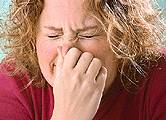
THURSDAY, Oct. 18 (HealthDay News) — A new study suggests that people who suffer from both hay fever and asthma may be less likely to die from colon cancer.
The research found that people with both hay fever and asthma were 17 percent less likely to die from colon cancer compared with people who have neither condition. But individuals with hay fever or asthma had little reduction in their risk of fatal colon cancer, according to the report.
People with hay fever and asthma are primed to develop allergic responses, which is why they have hay fever and asthma in the first place. The new theory is that they also mount an allergic response to colon cancer cells, said study author Eric Jacobs, strategic director of pharmacoepidemiology at the American Cancer Society in Atlanta.
“We are trying to understand how the immune system might be helping to slow down or prevent cancer,” Jacobs said. “Further research is needed in this area, and if it supports the idea that a naturally occurring immune response can attack some colorectal cancers, vaccines could be developed to treat these cancers.”
The study findings were scheduled for presentation Thursday at a cancer prevention meeting of the American Association for Cancer Research in Anaheim, Calif.
To arrive at their findings, the researchers analyzed data from two studies comprising about one million people each. None of the participants in either study had cancer when the studies began, but 19,000 died from colon cancer during the course of the studies.
The American Cancer Society estimates that about 52,000 Americans will die from colorectal cancers this year.
Dr. Andrew Chan, program director of the gastroenterology training program at Massachusetts General Hospital in Boston, said the new study marks an important first step.
“The hope is that we can build on this research and eventually develop a vaccine to treat colon cancer,” Chan said. “We need to understand better what it is that is [lowering the risk of dying from] colon cancer,” he said. “It’s possible that hay fever and asthma are markers of robust immune response.”
Chan added that eating a healthy diet and exercising regularly might also help people to prime their immune response and fight cancer.
Nearly 8 percent of U.S. adults have hay fever, according to the American Academy of Allergy, Asthma & Immunology. People with seasonal hay fever are allergic to pollen and spores. Some suffer from hay fever-like symptoms year-round, usually because of an allergy to dust mites, pets, certain chemicals or some foods.
These same allergens can lead to asthma symptoms — wheezing and cough — caused by inflammation of the airways.
The data and conclusions of research presented at medical meetings should be considered preliminary until published in a peer-reviewed medical journal.
And, while the study found an association between having hay fever plus asthma and a reduced risk of fatal colon cancer, it did not prove cause-and-effect.
More information
The American Cancer Society has more about colon cancer.

